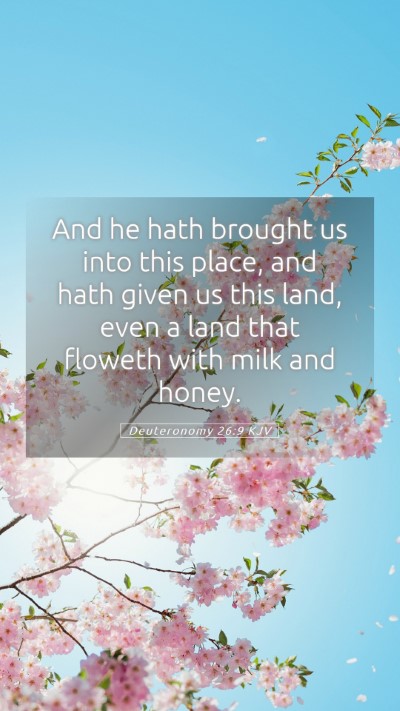Understanding Deuteronomy 26:9: A Comprehensive Bible Verse Commentary
The verse Deuteronomy 26:9 states, "And He brought us to this place, and hath given us this land, even a land that floweth with milk and honey." This passage encapsulates a significant moment in the Israelite narrative, highlighting God's provision and the fulfillment of promises made to the patriarchs.
1. Contextual Background
To appreciate the meaning of Bible verses, it's critical to understand their context. Deuteronomy is a reiteration of the Law as Moses prepares the Israelites to enter the Promised Land. This verse serves as a declaration of gratitude and acknowledgment of God's guidance throughout their journey.
2. Analysis from Commentaries
- Matthew Henry:
Henry emphasizes the act of God in delivering Israel from Egypt and leading them to a 'land of milk and honey', symbolizing prosperity and abundance. This highlights God's faithfulness in keeping His covenant.
- Albert Barnes:
Barnes focuses on the importance of remembrance in this verse. He points out that Israel's acknowledgment of God's blessings serves as a reminder of their identity and the covenant relationship established with God.
- Adam Clarke:
Clarke elaborates on the characteristics of 'the land' mentioned in the verse, comparing it with the current spiritual state of believers today. He highlights how this abundance reflects spiritual blessings believed to be fulfilled through Christ.
3. Theological Implications
Understanding Scripture also requires delving into its theological implications. This verse represents the transition from slavery to freedom, both physically and spiritually.
3.1 God as Deliverer
The declaration of God bringing Israel to the Promised Land invites believers to recognize Him as a deliverer in their own lives, reminding them that spiritual bondage can be overcome.
3.2 Abundance and Blessing
The imagery of 'milk and honey' signifies not only physical provision but also spiritual nourishment, concluding that God’s gifts are abundant and come from a place of love and care for His people.
4. Application to Daily Life
When studying the Bible, particularly this verse, consider how these principles apply to modern life. What does it mean for individuals today? Applying Bible verses to daily life can involve recognizing God's blessings and being thankful.
4.1 Gratitude in Daily Living
This verse invites believers to cultivate a habit of gratitude, echoing the sentiments expressed through similar verses in the Psalms and other writings throughout scripture.
4.2 Trust in God’s Provision
It encourages trust in God, assuring them that just as He provided for the Israelites, He continues to provide for His people today, often in unexpected and gracious ways.
5. Related Bible Cross References
- Exodus 3:8: God's promise of the land flowing with milk and honey.
- Joshua 24:13: The fulfillment of God’s promise to give the land to Israel.
- Psalms 106:7-8: Remembering God’s deeds with Israel and His faithfulness.
Conclusion
In exploring Deuteronomy 26:9, one arrives at a richer Bible verse understanding that celebrates God's faithfulness while calling for a response of gratitude and trust. For those participating in Bible study groups or seeking online Bible study resources, this verse serves as a foundational anchor for meaningful discussions about God’s provision.


